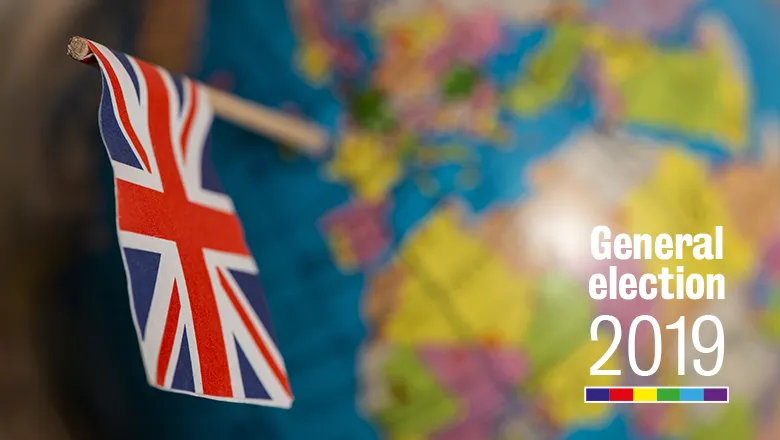For an election and subsequent period that will be of such great importance for the UK, the three main parties fail to propose a vision for Britain’s role in the world that is coherent or strategic.
Armida van Rij
09 December 2019
What the election could mean for Britain's foreign policy
Armida van Rij
ARMIDA VAN RIJ: What the party manifestos say about the UK's role on the world stage

The Policy Institute is producing a series of comment pieces analysing election manifesto pledges from the different parties across a range of policy areas. Read the full series here.
Britain’s foreign policy is changing, whatever form Brexit ends up taking (and provided it does eventually happen). Whoever enters No. 10 next will have the opportunity to shape the UK’s international relations and choose which issues the country champions on the world stage. So what are the Conservative Party, the Labour Party and the Liberal Democrats pledging in their respective manifestos, and how will these pledges impact the UK if fulfilled?
For all the Conservatives’ rhetoric about wanting to be a global player and increase the UK’s presence overseas, there is remarkably little by way of actual foreign policy pledges or commitments in their manifesto. A commitment to keeping the Armed Forces at the current level might be the least one could expect, but no. Instead, there are relatively generic statements about wanting to champion global issues such as collective security and anti-corruption, but little to no mention of how a Conservative government might do this in practice.
Equally absent is any mention of “Global Britain”. Previously touted as the cornerstone of the May government’s approach to international relations, it has now largely disappeared from public discourse. But given the Global Britain narrative remains an active concept behind the scenes, specific policy pledges on it might have reasonably been expected. Instead, the manifesto has a lacklustre commitment to maintaining defence spending at 2 per cent of GDP and aid spending at 0.7 per cent of GNI, thereby very much maintaining the status quo.
More interesting is the commitment to “further develop an independent Magnitsky-style sanctions regime” – the reason arguably being that the EU is strong on sanctions already, and after Brexit, the UK will need coercive foreign policy measures of its own.
Labour, on the other hand, is putting money where its mouth is by committing £400 million to the UK’s diplomatic capacity, as well as increasing funding for UN peacekeeping operations by £100 million. It doesn’t clarify where this money will come from, however. Labour states it will “maintain our commitment to NATO”, and maintain at least 2 per cent of GDP on defence spending – yet what that commitment will mean in practice under a party leader who has long been sceptical of the alliance’s value is not clear.
Labour also discusses investing in local capacities to prevent conflict and help peacebuilding. This is important, as for too long conflict prevention strategies have failed to recognise the power and agency of local actors, which are crucial for sustainable peacebuilding. But more detail on the process of deciding which local capacities will be supported, how, and what role will remain for the UK, would have been helpful.
Labour’s manifesto appears to try and tread a careful line between a commitment to human rights and a recognition of the importance and value of the British defence industry. Some of this, however, remains irreconcilable. Halting all arms sales to Saudi Arabia for use in Yemen, as is currently pledged, will lead to job losses in the UK – this is simply inevitable and there exists precedent for this. This fact, however, is not addressed in the manifesto. Instead, in the section about the defence industry, the manifesto says: “Labour will continue to work with manufacturers, unions and export partners in line with Labour’s foreign policy to support innovation in this sector to ensure it maintains its highly skilled workforce and world-class apprenticeship programme”. The question remains how it will do this, given that reductions in arms sales have an impact on income for defence companies, and by extension investment in R&D spending for new technologies.
The Lib Dems are also concerned about the current and future use of weapons. The same problem exists here with the pledge to suspend arms sales to Saudi Arabia. They also want an international treaty on the principles and limits of the use of technology in modern warfare, as well as a “policy of presumption of denial” for arms exports to countries listed as Human Rights Priority Countries in the Foreign Office’s annual human rights report. The latter is more consistent than singling out just one country, but the ramifications for UK defence, bilateral relations and UK influence abroad are not discussed.
It is clear that each of the parties sees Britain’s role in the world through its own particular political lens, which often results in conflicting and contradictory policy pledges. For an election and subsequent period that will be of such great importance for the UK, the three main parties fail to propose a vision for Britain’s role in the world that is coherent or strategic.
Armida van Rij is a Research Associate at the Policy Institute, King's College London.
